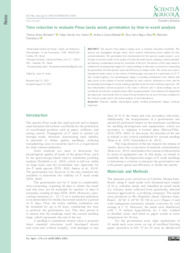Time reduction to evaluate Pinus taeda seeds germination by time-to-event analysis.
Time reduction to evaluate Pinus taeda seeds germination by time-to-event analysis.
Author(s): MICHELON, T. B.; SANTOS, F. S. dos; BELNIAKI, A. C.; VIEIRA, E. S. N.; PANOBIANCO, M.
Summary: ABSTRACT: The species Pinus taeda is largely used in intensive silviculture worldwide. This species has propagation through seeds, which requires determining seeds viability for their commercialization. The germination test recommended for this species usually requires up to 63 days to provide results on the quality of freshly harvested seeds, delaying commercialization and favoring contamination during the conduction of the test. The authors of this study aimed to establish the developmental stages of P. taeda seedlings to determine a criterion for interpreting the germination test with greater speed and efficiency to obtain results. The seeds were sown in transparent plastic boxes on two sheets of blotting paper and placed in a germinator at 22 °C with constant lighting. Five morphological stages of seedling development were defined with daily counts of the number of normal seedlings for each criterion, distribution in time, and the accumulated percentage of normal seedlings adjusted to time-to-event nonlinear regression. The new interpretation criterion proposed in this study is efficient, and P. taeda seedlings can be considered normal when cotyledon leaves differ by approximately 3 mm between the integument and hypocotyl, reducing the time to conduct the germination test by up to ten days compared to the criterion usually used in the routine analysis of seed laboratories.
Publication year: 2022
Types of publication: Journal article
Unit: Embrapa Forestry
Observation
Some of Embrapa's publications are published as ePub files. To read them, use or download one of the following free software options to your computer or mobile device. Android: Google Play Books; IOS: iBooks; Windows and Linux: Calibre.
Access other publications
Access the Agricultural Research Database (BDPA) to consult Embrapa's full library collection and records.
Visit Embrapa Bookstore to purchase books and other publications sold by Embrapa.

